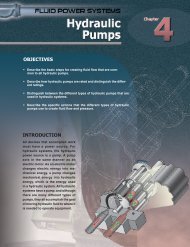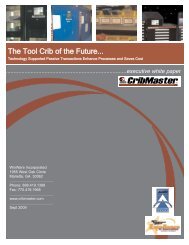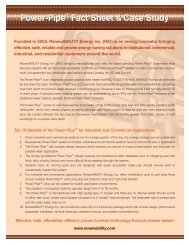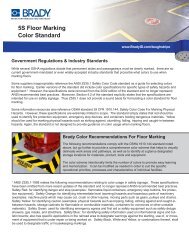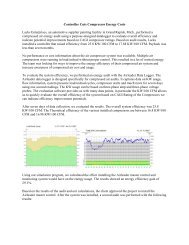POWER UP A WINNER - Plant Services
POWER UP A WINNER - Plant Services
POWER UP A WINNER - Plant Services
You also want an ePaper? Increase the reach of your titles
YUMPU automatically turns print PDFs into web optimized ePapers that Google loves.
our group of experts and provide an “In the Trenches” guest<br />
response. Put your thoughts in front of your magazine-reading<br />
peers and online readers. For further information, contact<br />
Executive Editor Russ Kratowicz at russk@putman.net or<br />
(630) 467-1301 x 309.<br />
An attorney says:<br />
Acme isn’t alone in moving from a defined benefit pension<br />
plan to a defined contribution plan. Many employers have<br />
made this change in recent years.<br />
The best way to make such a change, to disadvantage as<br />
few employees as possible, is to review various scenarios<br />
and build the new plan so that it adversely affects as few<br />
long-term employees who are close to retirement as possible.<br />
Those who have been with the company for a few years<br />
might not remain, and younger employees have far more<br />
years to accumulate contributions under the new retirement<br />
plan. As a result, they would feel the effects much less.<br />
Once the new plan has been properly developed, the key<br />
is good employee communications. Had Acme thoughtfully<br />
developed its defined contribution plan and explained to<br />
employees, especially older ones, such as Penny Black, that<br />
the change would minimally affect them, it would have had<br />
far fewer problems.<br />
In a normal economy, the value of employee loyalty would be<br />
difficult to quantify. But in the current economic drought, for<br />
every employee who quits there are probably 10 unemployed<br />
workers standing in line to apply for the job. Rather than a loss<br />
of employee goodwill and loyalty, the cost of a law suit remains<br />
a heftier threat to an employer today, especially one that<br />
struggles to stay afloat in these perilous times.<br />
As usual, Acme has acted too quickly and with not<br />
enough planning and foresight. Both the company and its<br />
workers likely will suffer the effects of a poorly planned<br />
change.<br />
Julie Badel, partner<br />
Epstein Becker & Green, P.C.<br />
(312) 499-1418<br />
jbadel@ebglaw.com<br />
A maintenance planner says:<br />
In my opinion, a class-action law suit based on age discrimination<br />
by Acme has no basis here. Acme offered two choices<br />
of retirement plans for the older employees during the<br />
five-year transition period, which seemed to be a generous<br />
offer on the part of the company. If anything, the younger<br />
employees should have an issue with not having a choice of<br />
plans when they reach retirement age. Defined-benefit pension<br />
plans can be a drain on a company’s balance sheet, and<br />
might not have a place in the economy of today.<br />
Could this situation have been avoided Yes. Treat each<br />
employee, regardless of years of service, on an equal basis.<br />
Acme could have set a definite date for the pension plan to<br />
be terminated, vested all employees, and then paid out the<br />
retirement funds they had accrued based on the calculation<br />
contained in the plan. These funds could then have been<br />
rolled into a 401(k), IRA or similar plan. It’s not an ideal<br />
situation for those close to retirement, but it would provide<br />
a substantial lump sum to the older employees to fund one<br />
<strong>UP</strong>Per manAGement should forego<br />
some, or all, of their year-end<br />
bonuses in an eFFort to shore up<br />
the shaky financial sitUAtion.<br />
of these retirement options. In addition, upper management<br />
should forego some, or all, of their year-end bonuses in an<br />
effort to shore up the shaky financial situation and to show<br />
the employees evidence of management’s commitment to<br />
them and to the company.<br />
These changes definitely would have an effect on employees’<br />
morale and their confidence in the company’s<br />
future. Acme’s management would need to be proactive<br />
and communicate to employees. Workers want to know the<br />
status of the company and the reasons for the change to the<br />
retirement plan from the beginning. Workers want to see<br />
a commitment to keeping the company viable. In addition,<br />
the company might offer some incentives such as 401(k)<br />
matching funds and awards for years of service as a way to<br />
retain valuable employees. Ideally, the employees would step<br />
up and support these measures and the situation wouldn’t<br />
deteriorate into an “us-versus-them” situation, which could<br />
result from less-than-clear communication.<br />
Acme’s biggest mistake in this situation was offering the<br />
five-year transition period, which allowed its obligations to<br />
multiply exponentially each year. Acme’s financial obligation<br />
to the pension plan would be better addressed early<br />
while the company had the means to fully fund the plan<br />
instead of waiting five years while hoping the company’s<br />
financial situation improves. Defined-benefit pension plans<br />
are much harder to keep funded, with even the largest<br />
organizations grappling for the means to fund their evergrowing<br />
responsibilities to the plans.<br />
Bryan G. Trantham, maintenance planner<br />
Evergreen Packaging-Waynesville Facility<br />
(828) 646-2140<br />
tranthb@blueridgepaper.com<br />
www.PLANTSERVICES.com APRIL 2009 45





